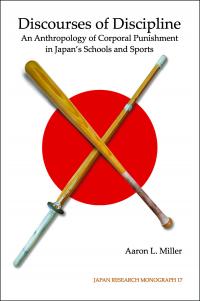Discourses of Discipline
Discourses of Discipline
Aaron L. Miller
Beginning with case studies, this book uncovers the "corporal punishment" (taibatsu) in Japanese schools and sports. Miller considers the definition of this controversial term, which ranges from abuse to a "necessary evil." Also discussed is the prevalence of such punishment and its acceptance and even encouragement by parents, educators, and coaches.
As a nonprofit academic press, we need your support to publish our books. Your gift can help us make more of our titles available as e-books. DONATE NOW
Title information
This book is about the many "discourses of discipline" around "corporal punishment" (taibatsu) in Japanese schools and sports. These discourses encompass the ways that people discuss discipline, the patterns of rhetoric about what discipline would be, and what discipline signifies. By scrutinizing these discourses we can disentangle the allegedly intimate connections among culture, discipline, and pedagogy in Japan. This anthropological study sheds light on the relationship of the education system and the economy and differences between Japan and other nations, as well as between classroom education and sports education.
Aaron L. Miller
Aaron L. Miller is an assistant professor and Hakubi Scholar at Kyoto National University. He has worked extensively on Japanese sports coaching and educational discipline. He is the author of Discourses of Discipline: An Anthropology of Corporal Punishment in Japan's Schools and Sports (IEAS, 2013).
B.A., Political Science, University of California, Los Angeles; M.S./Ph.D, Socio-cultural Anthropology, University of Oxford
Discourses of Discipline (JRM 17)
Introduction – 1
Three Stories of Taibatsu
What Is Taibatsu?
Why We Should Study Taibatsu in Japanese Schools and Sports
Thesis and Chapter Summaries
1. Anthropology and Corporal Punishment – 31
Corporal Punishment (Research) Today
How Anthropology Can Help Us Better Understand Corporal Punishment
2. Histories – 47
"Taibatsu" Before the Term "Taibatsu" Existed
Prewar Legal Prohibitions of Taibatsu
Postwar Legal Prohibitions of Taibatsu
The Postwar Construction of Taibatsu as "Solution," "Problem," and "Non-Issue"
3. Contexts – 82
The Importance of Context
The Forms of Discipline
The Genders of Discipline
The Spaces of Discipline
The Inflictors of Discipline
The "Languages" of Discipline
4. Ethics – 98
Conflicting Sports and Classroom Pedagogies
Arguments of Right and Wrong
Arguments in Favor
Arguments Against
5. Purported Causes and Plural Cultures – 125
Causal Interpretations of Corporal Punishment Worldwide
Structural "Causes" of Taibatsu in Japanese Schools and Sports
Cultural "Causes" of Taibatsu in Japanese Schools and Sports
Beyond Culturalism
6. Discourses of Power and the Power of Discourse – 154
The Importance of Historical and Cross-Cultural Analysis
Theories of Power, Violence, and the Body
Silence, Words, and Actions: How Discourses of Discipline Are "Powerful" in Their Own Right
Epilogue – 164
Beyond the "Violent Culture" Myth
Appendices – 171
Bibliography – 203
Index – 235
|
BLURBS |
|
"Corporal punishment of children by teachers and coaches is a widespread practice in many countries, but especically in Japan, where it has become a front-page issue involving Olympic athletes. Miller explores this issue both historically and in contemporary practices and analyzes how various discourses regarding disciplinary actions have shaped Japanese understandings of their 'educational reality.' To understand this phenomenon, Miller rejects Ruth Benedict's culturalist theory and, instead, places physical discipline (taibatsu) in the context of Michel Foucault's theory of violence and power, offering an incisive analysis of a complex issue." ~Harumi Befu, professor emeritus, Stanford University |
|
"An intriguing and well-written analysis on molding character in Japanese schools and sports through the widespread use of corporal punishment. Miller frames his discussion in the contexts of Japanese cultural ideals about discipline, toughness, and self-improvement, as well as in Japanese preceptions of such forms of discipline as something uniquely Japanese. This book is an important contribution to understanding the social and cultural dynamics of core institutions in contemporary Japan." ~Theodore C. Bestor, Harvard University |
|
"Corporal punishment as a discipline of pain and an abuse of adult authority is a troubling presence in Japanese classrooms and sports fields. This is an insightful and wide-ranging analysis that overturns simple judgments with a nuanced exploration of the historical development, sociocultural locations, and heated national discourse on corporal punishment in modern Japan. It is a significant contribution to our understanding of Japanese education and sports, and it is an original anthropological perpective on how we might theorize power in Japanese society." ~William W. Kelly, Yale University |
|
JOURNAL REVIEWS |
|
"[This book] present[s] a thorough contextualization and rethinking of the issue [of corporal punishment] and in doing so paves the way for others to find the answers....It would be essential reading for anyone interested in Japanese sport and, considering other issues and problems (bullying, school refusal, and drop-out) faced in Japanese education, a way of examining various problematic relationships of power. Finally this book exposes the culturalist shortcomings in explaining violence in a given society." ~Brent McDonald, Victoria University, in Pacific Affairs 88, no. 4 (December 2015): 932–934. |
|
“This book adds nuance to corporal punishment research that has been long overdue and is a crucial addition to the Anthropologies of Young People, Education and Violence and should become essential reading for anyone – theorist or practitioner – working on questions concerning matters of discipline and punishment.” ~ Franziska Fay, School of Oriental and African Studies (SOAS), in Children’s Geographies 15, no. 3 (2017): 381–383. |

